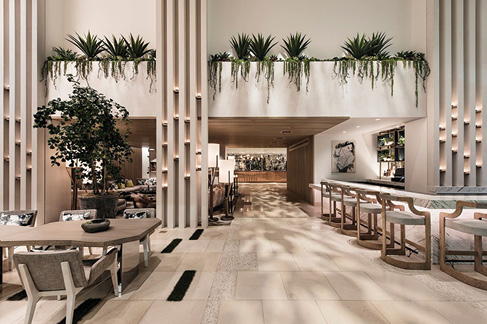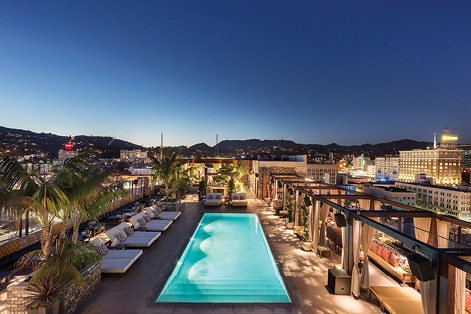- Home
- Media Kit
- Current Issue
- Past Issues
- Ad Specs-Submission
- Ad Print Settings
- Reprints (PDF)
- Photo Specifications (PDF)
- Contact Us


![]()
ONLINE

Growing Dream
Editors’ Note
Jay Stein has held his current post since December 2015. Prior to this, he served as Chief Operating Officer for Dream Hotel Group, formerly known as Hampshire Hotels Management, LLC; Area General Manager for Starwood Hotels & Resorts Worldwide, Inc.; Area General Manager New York City for Doral Hotels and Resorts; and Food and Beverage Manager for Hilton International.
Company Brief
Dream Hotel Group (dreamhotelgroup.com) is a hotel brand and management company with a rich, 30-year history of managing properties in some of the world’s most highly competitive hotel environments. Home to its Dream Hotels, Time Hotels, The Chatwal and Unscripted Hotels brands, Dream Hotel Group encompasses three business lines: Proprietary Brands, Hotel Management, and Dining & Nightlife. The company is committed to the philosophy that forward-thinking design, service and guest experiences should be available across market segments. After thoughtful evaluation, and to leverage its world-renowned Dream Hotels brand, the company decided to sunset the Hampshire Hotels Management name in 2015. The change to Dream Hotel Group capitalizes on the company’s most recognized assets to help raise awareness among guests, hotel owners and hotel developers.

Dream Hollywood lobby
Will you discuss the state of Dream Hotel Group’s business and the growth for the individual brands within the group?
We have been a bit surprised. We expected our Chatwal brand to see the slower growth of the four brands, but it’s turning out to have one of the faster growths at the moment. However, I don’t think that will last forever unless we truly become a five-star luxury player.
There is a lot of interest in the Chatwal brand. We are developing one ourselves and have had some interest in Mexico, which has been a good market for us. We also have an Unscripted in Tulum, Mexico and we signed a Chatwal in San Miguel de Allende, which is a great city in the center of that country. We are hoping to sign another Chatwal in a different part of Mexico in a few weeks.
There is also good interest for the Chatwal brand in Spain and we hope to make some announcements there soon. There is also interest in Asia, which has been surprising.
The Time brand tends to be the slowest in regard to growth at this point, because it does go head-to-head with Dream and most developers would rather talk to us about a Dream opportunity.
The Dream has some unique requirements with high-volume food and beverage opportunities at multiple venues and high-energy nightlife components, and it needs to be in the right city, so not every piece of real estate is appropriate for a Dream. Even so, Dream is our most famous brand and is usually the first brand our partners want to work with.
Unscripted is the newest of the brands. There is good interest there and there is probably more in the pipeline there than at any of the other brands. It’s just starting and there is only one Unscripted currently open, so it will take some time to get that brand kickstarted. We do have one property under development in Birmingham, England at the moment and we just signed a deal for a large Unscripted in Belgium, right on the border with France. We’re also working on opportunities in Austin, Belize, and Tulum, so we do have a number of deals signed and a few more we’re working on in Asia as well. We hope to announce those soon, including Vietnam.

Dream Hollywood pool
As you grow the Chatwal and Unscripted brands, will there be certain common characteristics that guests will expect at each property, or will the hotels be customized for each local market?
It’s a bit of both. One might recognize common elements upon walking in, but we’re more specific to the location. Even if it’s not designed specifically to the locale, there will be a uniqueness about the property. The designer will steer the property into a statement, be it a local statement or one shaped by the design in general. For instance, there may be a Moroccan themed hotel in Paris.
To be a true lifestyle luxury property, we’re not looking to do the traditional, sedate, low-energy version of luxury. We’re bringing more of our lifestyle and energy into that luxury to satisfy the modern-day luxury traveler and to bring a high ADR.
That feeling will be the common element one will see as opposed to a cookie cutter luxury product. That goes for all four of our brands.
One could never walk in and know immediately that something was an Unscripted, because we come from a history of independent hotels – all of these brands were one-off independent properties and they weren’t dreamed up to be part of a larger brand when they started.
They come from the great tradition of boutique hotels. They all end up being great, truly appropriate for the areas they’re in and for the community to use – not just the travelers that come from outside.
What has been the key to the success you have had in the food and beverage space, whether it be for Dream, which is known for its food and beverage offerings, or with the relationship that The Chatwal New York has with Geoffrey Zakarian?
Everyone says they want to be authentic and local in its food and beverage offerings, and I’m glad they are because it’s where our industry should have been heading for a long time and we’re finally on track.
I don’t think everybody is able to do this successfully or that they put the commitment into doing it like we do. We are truly focused locally on our communities.
Most guests who stay with us primarily need a place to have breakfast and possibly enjoy a cocktail. More often than not, the guest is more than capable and happy to go out in the city and experience the great things it offers.
Our hotels offer exciting and vibrant dining and nightlife options that reflect the city it calls home. Our goal is to build properties that truly become a part of the community so that guests walk into the lobby and see a buzzing scene with locals enjoying themselves and, in turn, our guests want to be part of that fun.
Do you still see the general manager role as a hospitality role or has it become more of a financial/business function?
It’s a mix. We have other people on staff who are not General Managers and whose job is to worry about the financials, but to be a real hotel leader is more than just that. I need leaders who build great teams – otherwise we become a commodity and that is not what Dream Hotel Group is about.![]()